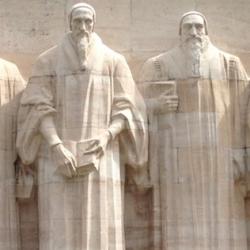Reviewing Carlos Eire’s Reformations at First Things, Eamon Duffy claims that “Protestantism ‘desacralized’ the world by accepting an essentially binary division of reality into spirit and matter. That division was expressed in Reformation iconoclasm and the rejection of the notion that material objects—the bread and wine of the Mass, relics, images—could be vehicles of spiritual reality.”
That may be true in some limited degree, but it fundamentally misses the force of the Reformers’ protest against medieval customs. They didn’t mount a metaphysical critique, but an evangelical one. They rejected relics and images because they believed the Bible did (and I agree); pastorally, they worried that relics and images distracted people from places of genuine encounter with God, the places where God promised to give Himself.
One of these places, for Luther, Calvin, Bucer, and in some ways even Zwingli, was the Supper. Luther and Calvin certainly didn’t reject the notion that material objects “could be vehicles of spiritual reality.”
Duffy goes on: “outlawing prayer for the dead and denying that the saints could pray for us, the Reformation ‘stripped religion of mediation and intimacy . . . with the dead,’ transforming it into ‘something strictly for the living, . . . more pragmatically focused on this world.'”
This is more accurate, but: A focus on this world is precisely what the Reformers found in their Bibles.
Finally, Duffy claims that the Reformation left behind “two ‘very different kinds of Christianity, and of two worldviews within Western culture.’ And it was this fragmentation, inaugurated by contested reformations, that gradually turned religion ‘into a private concern rather than a public one.'”
This is the most plausible, forceful critique of the Reformation, but even this requires qualification. Accent should be placed on that “gradually.”
No Reformer of the sixteenth or seventeenth century thought religion was “a private concern.” If they had, they wouldn’t have written hortatory tracts to the German nobility (Luther) or included a section on political authority in their summary of Christian teaching (Calvin) or addressed a lengthy treatise on reform of church and state to the English king Edward VI (Bucer).











